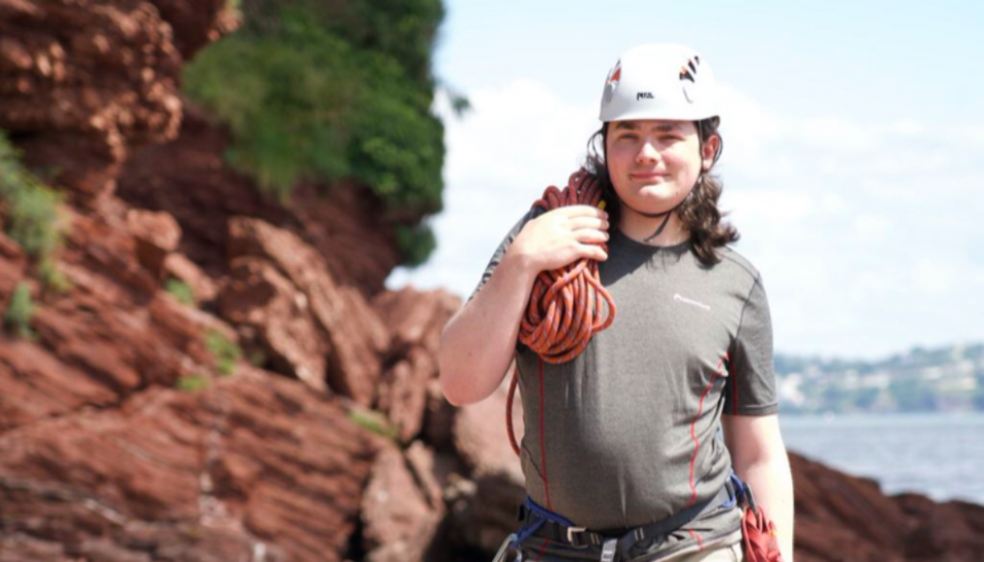
Clearing doesn't mean you have to leave home...
When A level results come out on August 10, more than three quarters of students who want to go to university are likely to get into their first choice. But not everyone will have secured their places – but it doesn’t mean you won’t get a degree if you still want to, or travel far from home to get one.
Last year, a record number of students – more than 70,000 - found university places through Clearing – a system which helps universities match students who don’t have a place to courses which still have space.
“This summer, once again we will be offering Clearing places and there will be opportunities across the full range of subject choices,” says Lauren Hardman, Senior Admissions Coordinator at University Centre South Devon (UCSD).
One student who is enjoying studying at UCSD is 21 year old Owen Keith-Hill. Owen, who is from Torquay, decided to stay local to study an Adventure Sports Leadership degree.
“This degree course isn’t available everywhere and I was really keen to stay local,” he explained. “I know the area and I know the tutors having taken other courses there. I can also live with my family so it saves me money on rent. I can also commute to university which gives me lots of flexibility.”
Owen isn’t the only one who has opted to study locally, a Universities and Colleges Admissions Service (Ucas) survey of more than 20,000 pupils planning to go to university suggested that nearly a quarter (23%) of applicants are planning on studying closer to home.
Debbie Shore’s daughter, Tilly, is studying a Psychology and Sociology degree at UCSD and didn’t feel the need to leave Devon.
“She has been studying at South Devon College since she was 17,” explained Debbie, “And she has lots of support there, she knows the tutors and for her it’s a smoother transition from further education to higher education.”
Debbie says studying locally for her daughter is like having an additional comfort blanket to let her grow a bit more, and give her the freedom to focus 100% on her studies.
“I think it’s important for students to know that there is the opportunity to stay local and go to a university centre and get the same qualifications.”
Last year’s most popular choices in Clearing at UCSD were social sciences, education, science, creative arts and law. Many subjects still have vacancies, but Clearing is a hectic time – courses are snapped up and students often need to decide swiftly on their futures. Every careers adviser will advise you against making panicked decisions, and some prefer students to defer and reapply the following year.
Some universities and colleges advertise course vacancies on their websites from July when Clearing opens while others wait until around A level results. But you can only enter Clearing once you’ve got your results but don’t have a confirmed place. And more than ever now, students are using Clearing to apply to university directly for the first time - numbers of direct applicants rose by 15 per cent last year.
While universities and colleges won’t accept you through Clearing until you have results to hand, you can do a lot of legwork beforehand if you think you may have missed your grades – and remember your first choice university could still accept you on the day even with slightly lower grades.
You could research courses in the same subject at different institutions, or look at what similar subjects are offered by the same university – animal science instead of veterinary for instance.
Universities and colleges advise students to write a list of potential courses – with bullet points and important details. You can even phone universities in advance and register your interest and details with them, which will save time on results day – you’ll already be on their system. When you call a university or college in clearing, they might offer a course straight away, or want to know more – fundamentally “why this uni, why this course?”
“We want to see your enthusiasm and passion for a course,” says Lauren Hardman, Senior Admissions Coordinator at UCSD.
On the day itself, you can check Ucas Track first thing to see if you’ve been accepted, or if you’re in Clearing. If you are, remember it’s fine to feel emotional and that admission staff are friendly and used to calming tearful students. Many people on the end of the phone are student volunteers who’ve gone through the whole process themselves.
“All universities and colleges will have a minimum standard in mind,” says Lauren Hardman. “But even if you have lower grades, you may still be able to secure a place. Here at UCSD we assess each individual on their own merit, we want to see that you can demonstrate your passion for the subject and have an appropriate level of skill and knowledge.”
Owen, who has just finished the first year of his degree says it’s giving him lots of opportunities and options for the future. “The resources and facilities on site are excellent and I get a lot of support from the tutors.” Owen’s career plans include one day having his own outdoor adventure centre.














